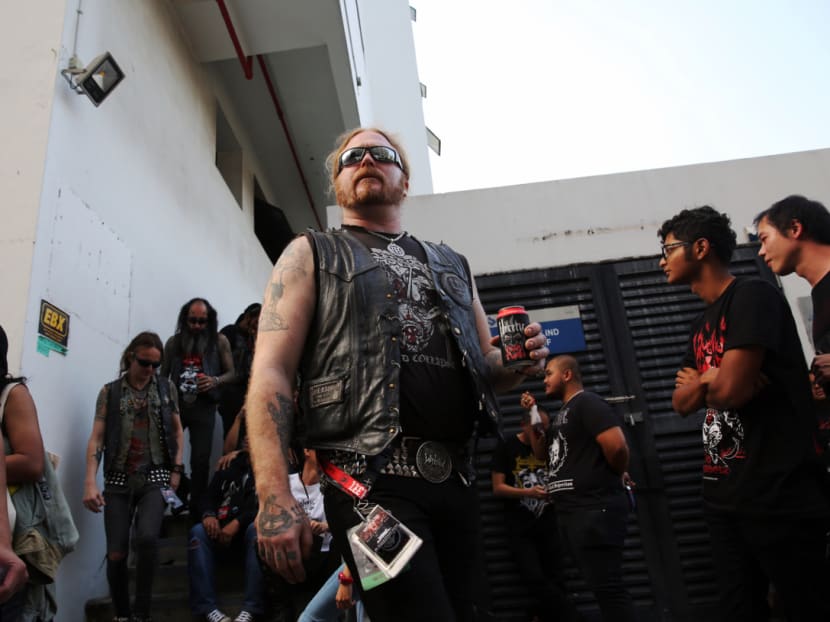Many Christians were ‘very concerned and offended’: Shanmugam explains reversal of decision over metal band concert
SINGAPORE — The authorities had made a “judgement call” in allowing Swedish black metal band Watain’s concert to go on with certain restrictions, but reversed it after receiving reports of mainstream Christians “being very concerned and offended”, Home Affairs and Law Minister K Shanmugam said on Monday (April 1).

Band member Pelle Forsberg at the event venue after IMDA cancelled Swedish black metal band Watain's concert on March 7, 2019.
SINGAPORE — The authorities had made a “judgement call” in allowing Swedish black metal band Watain’s concert to go on with certain restrictions, but reversed the decision after receiving reports of mainstream Christians “being very concerned and offended”, Home Affairs and Law Minister K Shanmugam said on Monday (April 1).
The Info-communications Media Development Authority (IMDA) initially imposed a slew of restrictions on the concert when it was issued a restricted licence on March 5, despite concerns from the Ministry of Home Affairs (MHA).
Among other conditions, the concert would be classified R18, “potentially sensitive songs” would be removed, and there would be no ritualistic or satanic acts. The use of religious symbols during the concert was also not allowed, and there would be no references to religion.
However, the authorities pulled the plug on the gig with hours to go on March 7.
Setting out the events leading up to the cancellation, Mr Shanmugam said the ministry’s initial assessment of the concert was that it “should be acceptable” if Watain did not perform offensively here. However, the reality turned out to be different, he added.
“Given that many Christians felt this was deeply offensive and denigrating, MHA advised IMDA to cancel the concert. It was my decision that MHA should so advise IMDA,” Mr Shanmugam told the House, as he spoke at length on the subject of hate speech.
Earlier last month, he told reporters that the ministry conducted a further security assessment and decided that the concert would be against public order interest, and would affect Singapore’s religious and social harmony. This was in light of its “history of denigrating religions and promoting violence”.
On Monday, Mr Shanmugam noted again that Watain’s lyrics and beliefs “denigrate Christianity in a seriously offensive manner” — something their own fans acknowledged.
“It was a judgement call. The band comes from a largely Christian country… As I said earlier, we thought if we told them you will not play any lyrics that are offensive to Christians, and if we imposed the other conditions I referred to, that would strike an appropriate balance,” he said.
“Our (initial) assessment was different from what actually transpired. When you make assessments, sometimes the reality will turn out to be different,” he added.
Church leaders whom the authorities spoke to understood the rationale, but nevertheless felt the performance should not be allowed. The authorities then decided to cancel it when they believed this was the mainstream Christian view, Mr Shanmugam said.
He pointed to a Reach survey conducted after the cancellation, which showed that 64 per cent of all who heard about it — Christian and non-Christian — agreed with the move.
“This shows that majority of the population hold views that are similar to the way the Government has been applying the rules. This shows that this is a population which values religious peace,” Mr Shanmugam added.
In a statement on Monday, Reach said that it conducted the survey through a telephone poll from March 11 to 15 this year, with 680 randomly selected Singapore residents aged 15 and above.
About 60 per cent of respondents were aware of the Government’s decision to ban the concert. Among them, about two-thirds supported the decision. Younger respondents in their 20s and free-thinkers were more likely to disagree with the decision.
A quarter of the respondents felt performances that could impact religious sensitivities in Singapore should be banned, while two-thirds felt that these could be allowed but with specific rules banning offensive content.
Similarly, younger respondents were more likely to feel that performances that could impact religious sensitivities should be allowed with specific rules.
SEQUENCE OF EVENTS
End-December 2018: IMDA received the organiser’s application.
MHA was informed of the application, and told IMDA that it objected to the concert.
IMDA requested the MHA to reconsider its position. It also proposed detailed licensing conditions and requirements, including:
The concert would be classified “Restricted 18 (R18)”
Potentially sensitive songs would be removed
Religious symbols would not be used
No performance of ritualistic or satanic acts
The band would not be able to make religious references in their on-stage dialogue
Its content should not denigrate any faith or promote cult practices, nor advocate or promote violence in any way
MHA told IMDA that while it was still concerned, it would leave it to IMDA to decide on issuing such a restricted licence.
March 5, 2019: IMDA issued the restricted licence.
MHA received reports of mainstream Christians being “very concerned and offended”. MHA officers met with the National Council of Churches Singapore and the Archdiocese of Singapore, and Members of Parliament also gave feedback.
March 7: MHA asked IMDA to consider cancelling the concert.











